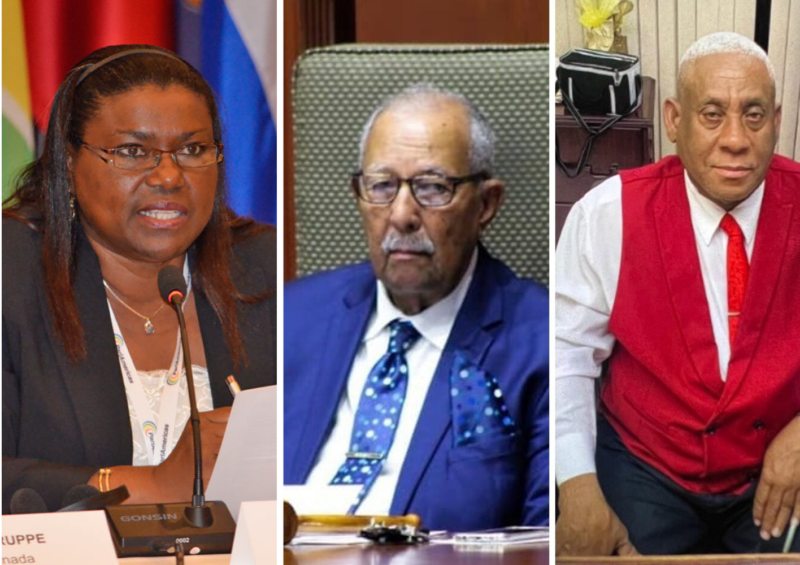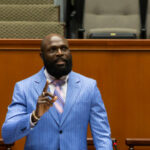
In Search of an Independent Speaker
By Kieron Murdoch | Opinion Contributor
The departure of the Speaker of the House Sir Gerald Watt KC after ten years is the opportune moment for the nation to reflect on the purpose of the Speaker’s office, and what citizens of this democracy ought to demand from the person who occupies it. The office of the Speaker desperately needs to evolve into an apolitical and scrupulously impartial post. The business of appointing retired politicians, quasi-politicians, party officers, or persons with partisan leanings to sit in the chair ought to cease.
Why? Because appointing such persons to the post brings about a situation where the Speaker – who should sit at the apex of the parliamentary system as a respected arbiter of order and good practice – does not command the respect of the whole House and often displays their bias to the detriment of the conduct of parliamentary affairs. In many cases, the person chosen for the position holds the confidence of only one side of the House (the ruling party), and stokes the ire of the other (the opposition).
At present, one could well argue that politics is certainly tied to the Speaker’s role even when the Speaker themselves (as you would expect) vehemently denies the politics behind their appointment, and professes to treat all members with fairness and no partiality. Yet, our Constitution does not expressly stipulate that the Speaker ought to display scrupulous independence and it provides no provisions to promote this.
The Constitution allows for both sitting MPs and persons outside of the House to be nominated to the role. Section 42 (2) states: “The Speaker may be elected either from among the members of the House or from among persons who are not members of the House but are qualified to be elected as such.”
Some would argue that the independence of the Speaker in our system is implied by Parliamentary convention, whether they are a sitting MP (likely elected on a party ticket) or whether they are drawn from outside of the House. The problem with convention is that it only remains so because it is consistently held to be the required norm. When it is neglected long enough, it effectively ceases to be a convention. Who would really argue that the independence of the Speaker has been an observed convention in Antigua and Barbuda?
One cannot expect to have a situation where the Constitution allows for (a) an elected (party) MP to sit as Speaker, but with no stipulations made as to their independence, or (b) where another person from outside the House is nominated, but with no stipulations made as to their independence, and expect that political loyalty or leaning is somehow going to be absent from the equation.
If you did, you would be presuming either that (a) your average party MP in Antigua and Barbuda is mature and responsible enough to completely put politics aside and discharge their duty as Speaker impartially were they placed in the role, or (b) in the case of a person who is not an elected MP, that the ruling majority of party MPs backed them for the Speakership on the basis that they would be scrupulously impartial and would treat the ruling party the same as they treat the opposition. Unfortunately, our politics still lacks such a level of integrity.
Notably, parties often claim that the sitting Speaker is biased while they are in opposition, and then get into power and put forward a candidate little better in terms of independence and impartiality than the one who they ran up against while they were in opposition. It is an affirmation of the absence of a person’s integrity if they complain of the unjustness of something when it was done against them, but swiftly do the same to their opponent when given the opportunity.
And let’s be honest. The Speakership is not so respected by Prime Ministers and political parties that they treat it as the sacrosanct independent office that it ought to be. The Speaker’s office is amongst the bundle of political rewards handed out to party affiliates, loyalists, functionaries, and sympathisers, or those once scorned by an opposing party and having a large and formidable axe to grind.
This bundle of rewards tends to include other posts like Senate appointments, board chairmanships, and ambassadorial posts. Politics is politics. Let us not for a moment pretend that there is any more integrity in the assignment of such positions than there really is. And let us not pretend that the Office of Speaker has been above politics over the decades. Ruling party members – whoever is in power – enjoy greater liberties to interrupt, disrupt, and protest, as compared to their counterparts on the opposite benches, and they no doubt must enjoy the occasional put down delivered by a Speaker, more often to a member of the Opposition than to a member of the ruling party.
Why not aspire to a better standard for the selection of our Speaker, as opposed to retaining the current practice which, while not unique to Antigua and Barbuda by any means, ultimately impacts the conduct of Parliament adversely. It is certainly true that in most assemblies around the world, the Speaker is overtly political. Only in some places are they ostensibly required to display independence in practice, and in fewer places still do they actually do so.
The UK for example, is among a few places that has taken some steps to promote the independence of its Speaker, who is elected from among the MPs. Once elected to the role, their Speaker resigns from their political party and continues to be apolitical even in their retirement. In elections, the Speaker (who is an MP) runs as “Speaker” rather than as a candidate with a party affiliation, and it is the tradition that other major parties do not run a candidate against the Speaker, allowing them to avoid active political campaigning.
If Antigua and Barbuda wanted to better ensure the independence of the House Speaker, it would be advantageous to remove the Constitutional allowance for MPs to be elected Speaker altogether. In our political context, it will always be very difficult for a sitting MP within a political party to be as independent in their decisions, tone and conduct as they ought to be were they to occupy the Speaker’s chair. They would have to cease outward support for the party, desist from public political appearances, take no outward stances on political issues, and so on.
Naturally, it seems more feasible to secure the independence of the office by nominating a person from outside of the group of seventeen politicians elected to the Lower House of Parliament. But the required provisions would need to go further. We already have an allowance for non-MPs to be the Speaker, and that has been no guarantee of their independence, since there are no additional stipulations about how such a person is selected.
One suggestion is to require that the office holder is someone acceptable to both sides. That is to say, the nominee ought to be agreed upon by both the Prime Minister and the Opposition Leader before their election in the House. Also, it may also be worthwhile for the nominee to be put forward by the Governor General in their own discretion, after consultation with the PM, the Opposition Leader and other designated bodies, as opposed to the nominee being drummed up by the ruling party. There could also be expressed prohibitions introduced to limit the eligibility of persons who are politicians or political actors.
The idea that politicians alone have the knowledge, firmness and character to occupy the role of Speaker is ridiculous. On the contrary, the habit of making politicians or former politicians Speakers, tends to invite suspicion, mistrust, second guessing of their motives, and a lack of confidence by some portion of the House – and the constituents they represent – of the Speaker’s ability to discharge their duties with impartiality.
There are those who would raise a cry at the idea that politicians and respected statesmen should be barred from the role of Speaker in favour of scrupulous;y apolitical nominees. We respond by saying that no respectable statesman worthy of being called such, would disagree with the stance that there is a need to introduce and maintain the highest standard of impartiality and independence in the office of the Speaker of the House.
Politics is not solely about partisanship and the leadership of popularly elected officials or their delegates. It is also concerned with having due regard for the necessary separations that must exist between the exercise of various official powers across the length and breadth of government so as to prevent abuse.
Further, we should not weep for any politician who is undone by the idea that they would be prevented from occupying the Speaker’s chair. It is to ensure that when they themselves sit in the House, representing their many constituents, their views, and the interests of their constituents have an equal opportunity to be aired, and they do not fall victim to the tyranny of an openly biased Speaker, or even the occasional unjustness of a mostly fair, but sometimes partial Speaker. Citizens are entitled to demand that a Speaker be scrupulously impartial and demonstrably beyond reproach. Has Antigua and Barbuda enjoyed such a thing?
Another challenge worth mentioning is that a Speaker in our system, with our rules and norms presently as they are, may be inclined to display loyalty to a Prime Minister, upon whose insistence, the majority of ruling party MPs would have elected them to the chair. If a Speaker loses the confidence of the Prime Minister, they lose the Speaker’s chair. It becomes a challenge therefore, for a Speaker to deal with a Prime Minister with the same swiftness and sternness as they would the Leader of the Opposition, from whom they have nothing to fear.
It stands to reason therefore that if an impartial and independent Speaker is a desirable thing, that such a person must be free of the threat of being sacked for dealing with the Prime Minister of the government on equally severe terms as they deal with the opposition. The only way for this to happen is to create a system where it is not by the whim of the Prime Minister or the ruling party alone that a Speaker may be ordained, or alternatively, defrocked.
Some will argue that politics in the Speakership occurs in most places, and we are no worse than many other places. They would be correct. In some systems, the Speaker is actually a major political leader in their party, such as in the US. Regardless of what happens elsewhere though, we are not absolved of the responsibility to do what seems best for our own democracy. In some places such as the UK, it appears that convention is enough to secure the impartiality of a House Speaker, more or less. It should be our business to find measures that work for us, and our politics is such that provisions would have to be very stringent in order to get the job done.
Ultimately, the consequence of continuing to have Speakers who are elected party MPs, or not MPs but perhaps active or retired politicians, or not active or retired politicians but still active party members, or not active party members but known party sympathisers, or not party sympathisers but people with mountains of political baggage, is that the Speaker does not command the respect of the whole House, and invites mistrust and doubt over their motives. Worse, if they are overtly biasedas opposed to covertly so, they invite constant conflict which is largely unnecessary but which we tend to dismiss as just part of the politics.
Between 2004 and 2014, Gisele Isaac was accused of showing bias against those on the opposition benches. Sir Gerald has been similarly accused of displaying bias against those on the opposition benches between 2014 and 2024. Sir Gerald is now to be replaced by Osbert Frederick, an active Labour Party member who has in all recent elections, campaigned with the ruling party; has jostled against the opposition over the last 10 years as government Senator; and who spends considerable time on party-aligned airwaves taking part in political diatribe. His nomination to the role of Speaker of the House further demonstrates the point that our political parties and our Prime Ministers have zero notion of the Speaker as a truly apolitical officer.
It may take time to change this political mindset. It would take constitutional reform to introduce any chances that could make a difference. It will take the persistent objection from the many of us who know better. But we must admit, surely, we can do better.
About the writer:
Kieron Murdoch worked as a journalist and later as a radio presenter in Antigua and Barbuda for eight years, covering politics and governance especially. He is an opinion contributor at antigua.news. If you have an opinion on the issues raised in this editorial and you would like to submit a response by email to be considered for publication, please email [email protected].






So, Mr. Murdoch, the rules have changed since the kicking out of office of the pig in lipstick? Your partisanship is nauseating!
You are nauseating.
🥳😂